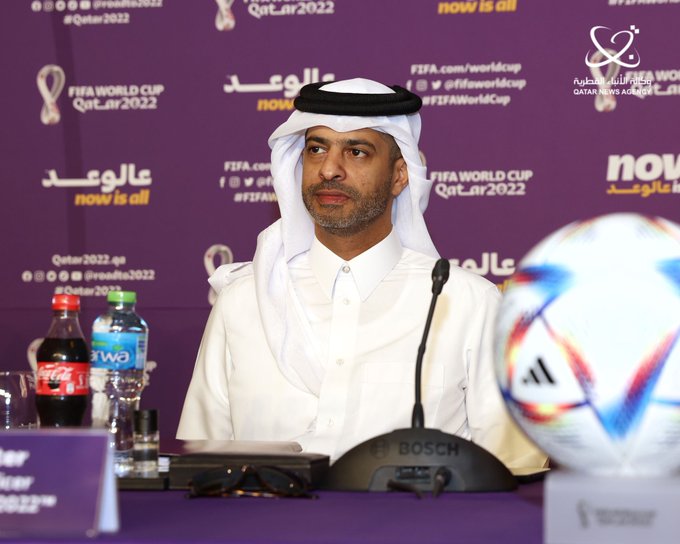The media campaign against Qatar’s hosting of the major event has only exacerbated in the lead up to the tournament.
The campaign against Qatar and its hosting of the 2022 FIFA World Cup is linked to Europe’s refusal to see a country outside its region take on the tournament, the Chief Executive Officer of Qatar 2022 Nasser Al-Khater said on Monday.
“European countries feel they have monopoly over the World Cup. Europe has hosted 11 tournaments out of 22 tournaments, of course it refuses that a country like Qatar or an Arab Muslim country hosts a tournament like the World Cup,” Al-Khater told Al Jazeera Arabic in a televised interview.
Al-Khater’s remarks come less than two weeks from kick off at the Middle East’s first ever World Cup, and amid increasing criticism targeting his home country.
Addressing the scrutiny, Al-Khater said the anti-Qatar campaign has evolved over the past decade, with aims taken at Qatar size as a geographically small country to its hot summer climate.
“From the start, we have said that this tournament represents all Arabs and is for the entire Arab world, this increases our excitement and our sense of responsibility and increases determination to make this tournament a success,” said Al-Khater.
Headlines mainly from western media as well as reports from rights groups have sounded the alarm on Qatar’s track record on human rights violation, especially with regards to migrant workers.
The Gulf state says it has responded to the concerns by introducing reforms to its legislation, all of which have received global praise by rights groups including the UN’s International Labour Organization, which has set up an office to oversee such changes in Qatar.
Despite this, headlines that have been repeatedly slammed by officials as “sensationalist” and “misleading” have continued to emerge across western press.
This was heightened when The Guardian published a controversial piece last year headlined, “Revealed: 6,500 migrant workers have died in Qatar as it gears up for World Cup”.
The article had linked the “shocking” death rate to the start of Qatar’s World Cup journey.
Responding to a question on the article, Al-Khater maintained that the total fatalities linked to the World Cup is three, noting that even The Guardian apologised for the inaccurate figure.
Al-Khater also pointed to the fact that labour reform has long been under Qatar’s Vision 2030 and said the protection of migrant workers’ welfare is not limited to the tournament itself.
“Do we deny that the World Cup accelerated reform and developments? No, on the contrary, the World Cup was among the key reasons behind the drastic change over the past 10 years,” explained Al-Khater.
Racism and inaccurate depictions
As the tournament edges closer, Qatari officials have taken a more head on approach to call out criticism, highlighting apparent angles taken by western media that has widely disregarded progress made on the ground.
Speaking to Sky News on Sunday, Qatar’s Foreign Minister Sheikh Mohammed bin Abdulrahman Al Thani said critics of the World Cup in Qatar are “arrogant” and “cannot accept a small country from the Middle East”.
Echoing the same sentiment, Al-Khater said accusations targeting Qatar have appeared to be backed by racist and political motives.
“We can say that they are highly racist given that a country like Qatar, an Arab Islamic country, a small country, was able to compete with large countries that consider that they are more deserving of hosting this tournament,” noted Al-Khater.
Last year, various European countries doubled down on scrutiny with the launch of a campaign to boycott the World Cup. These include Denmark, the Netherlands, and France. However, despite this, ticket sales have spiked in Europe.
“The reality is that the world is looking forward to this celebration. Over 97% of the tickets have been sold. Among the ten countries that bought the most tickets, we find European countries like France,” Sheikh Mohammed told France’s Le Monde on Friday.
Meanwhile, the World Cup CEO added that Europe has long seen the Arab world as a conflict-ridden region, a depiction that has also been repeatedly highlighted in its media discourse.
This week, French outlet Le Canard Enchaîné has come under fire for publishing a caricature depicting Arabs in ‘Qatar’ football kits as terrorists. The image employs the exhausted use of ‘savages’ – ‘long bearded’ angry men with dark hair, angry expressions in possession of guns and knives.
However, Al-Khater believes the World Cup will debunk such images portrayed by Europe.
When asked about Qatar’s strategy in responding to the ongoing criticism, Al-Khater said that some were worth responding to while others were unworthy of an official address.
“For us, the success of the World Cup is a priority,” he said.
Among the concerns raised by Europe is Qatar’s hot summer weather, to which FIFA responded by moving the traditionally summer tournament to later in the year.
While the changed November-December schedule is a lot cooler in Qatar, the World Cup’s organising body has prioritised the issue of heat when designing and building all eight stadiums for the tournament.
Despite the change, critics then began taking aim at sustainability issues that come with the use of air conditioners at stadiums.
Responding to this, Al-Khater said heating is used in most stadiums across Europe during the winter season, noting heating uses up more energy than air conditioners.
“The stadiums were built based on foundations that are environmentally friendly, we also promised that this tournament is going to leave an environmental legacy as one that is carbon emissions free,” said Al-Khater.







